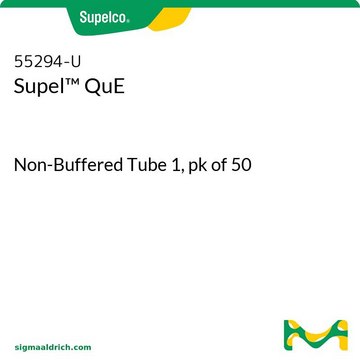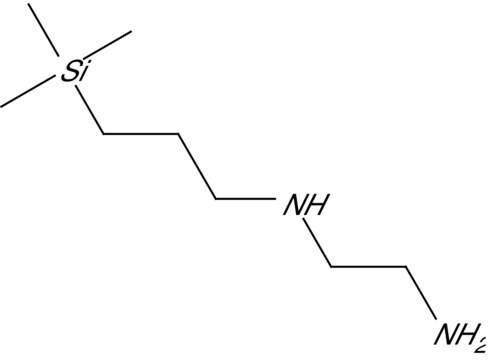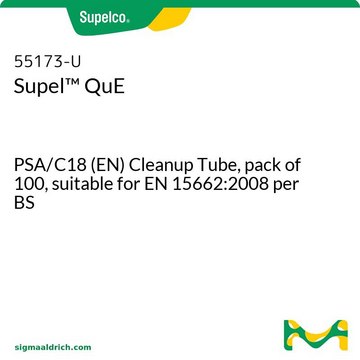55237-U
Supel™ QuE QuEChERS tube
Citrate/Sodium Bicarbonate Tube, pk of 50
Synonym(s):
QuEChERS
About This Item
Recommended Products
Product Name
Supel™ QuE, Citrate/Sodium Bicarbonate Tube, pk of 50
Quality Level
composition
magnesium sulfate, 4 g
sodium bicarbonate, 5 g (Cat. No. S6014)
sodium chloride, 1 g (Cat No. S7653)
sodium citrate dibasic sesquihydrate, 0.5 g (Cat. No. 71635)
sodium citrate tribasic dihydrate, 1 g (Cat. No. S4641)
packaging
pk of 50
technique(s)
QuEChERS: suitable
centrifuge tube volume
15 mL
application(s)
food and beverages
separation technique
ion exchange
Looking for similar products? Visit Product Comparison Guide
General description
Using the QuEChERS method, food/agricultural samples are first extracted with an aqueous miscible solvent (e.g., acetonitrile) in the presence of high amounts of salts (e.g., sodium chloride and magnesium sulfate) and/or buffering agents (e.g. citrate) to induce liquid phase separation and stabilize acid and base labile pesticides, respectively. Upon shaking and centrifugation, an aliquot of the organic phase is subjected to further cleanup using SPE. Unlike traditional methods using SPE tubes, in dispersive SPE, cleanup is facilitated by mixing bulk amounts of SPE (e.g., Supelclean PSA, ENVI-Carb, and/or Discovery DSC-18) with the extract. After sample cleanup, the mixture is centrifuged and the resulting supernatant can either be analyzed directly or can be subjected to minor further treatment before analysis.
Supelco carries a line of vials and centrifuge tubes containing pre-determined amounts of salts and SPE sorbents to support the most common method configurations used today.
Legal Information
required but not provided
Storage Class Code
13 - Non Combustible Solids
WGK
WGK 1
Flash Point(F)
Not applicable
Flash Point(C)
Not applicable
Regulatory Listings
Regulatory Listings are mainly provided for chemical products. Only limited information can be provided here for non-chemical products. No entry means none of the components are listed. It is the user’s obligation to ensure the safe and legal use of the product.
JAN Code
55237-U:
Choose from one of the most recent versions:
Already Own This Product?
Find documentation for the products that you have recently purchased in the Document Library.
Customers Also Viewed
Articles
SPE retention mechanism in this case is based on the electrostatic attraction of charged functional groups of the analyte(s) to oppositely charged functional groups on the sorbent.
Protocols
Retention occurs through polar interaction between the sorbent and analytes. Typical sample matrices that can be employed in normal-phase SPE include hydrocarbon or fatty oils diluted in a solvent like hexane, isooctane, chlorinated solvent, THF, diethyl ether, or ethyl acetate.
Related Content
QuEChERS is a ‘Quick, Easy, Cheap, Effective, Rugged and Safe’ sample cleanup method used to prepare food and agricultural samples for pesticides analysis. QuEChERS is based on the Solid Phase Extraction (SPE) technique of sample preparation.
QuEChERS method simplifies sample cleanup for pesticides analysis in food and agricultural samples.
Our team of scientists has experience in all areas of research including Life Science, Material Science, Chemical Synthesis, Chromatography, Analytical and many others.
Contact Technical Service







